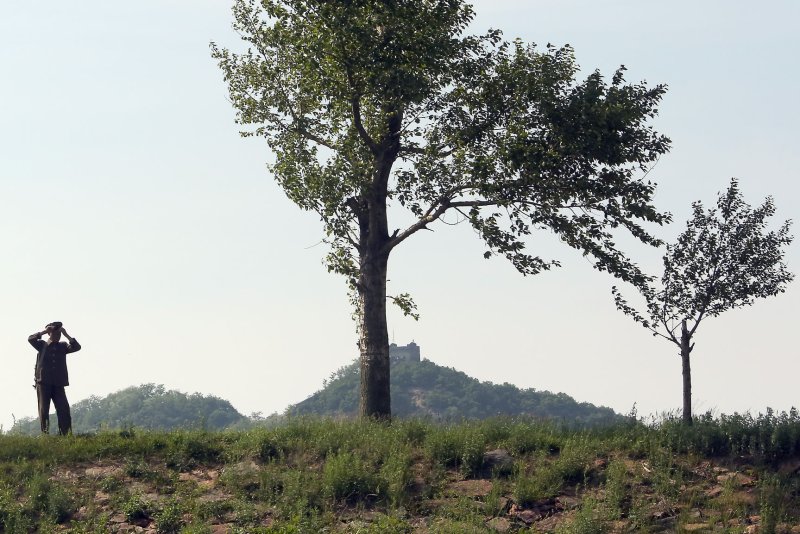A North Korean solider patrols the border near the North Korean city Sinuiju, across the Yalu River from Dandong, China. North Korea may have restarted work at its Yongbyon nuclear complex in early 2016. File Photo by Stephen Shaver/UPI |
License Photo
SEOUL, Oct. 26 (UPI) -- North Korea may have begun extracting weapons-grade plutonium at its Yongbyon nuclear complex in early 2016.
Writing for 38 North, a Johns Hopkins University website dedicated to North Korea issues, analysts Andy Dinville and Joseph S. Bermudez, Jr., said comparisons of thermal imagery taken from January 2015 to August 2016 show an increase in "concentrated heat patterns" at Yongbyon's radiochemical laboratory.
"These patterns reinforce reports based on satellite imagery that North Korea conducted a spent fuel reprocessing campaign earlier this year," the analysts stated in the article published Tuesday.
The radiochemical lab began to show a "more significant thermal pattern" in February 2016, indicative of "increased activity and very likely associated with a reprocessing campaign at this facility."
But other areas of the site, including the 5 MWe Reactor, demonstrated "no significant deviations" from 2015, Dinville and Bermudez said.
Imagery from August 2016 indicates that reprocessing had "already probably finished."
The report was published on the same day U.S. Director of National Intelligence James Clapper said current policy to persuade North Korea to give up its nuclear weapons is "probably a lost cause," the BBC reported.
Clapper, who was speaking at the Council on Foreign Relations, also said the Pyongyang regime is paranoid and see nuclear weapons as their "ticket to survival."
"The notion of giving up their nuclear capability, whatever it is, is a non-starter with them," Clapper said, while suggesting economic incentives may work to persuade Kim Jong Un.
This week, however, North Korea officials may have expressed interest in the possibility of revisiting the Sept. 19 Joint Statement on denuclearization after meeting with former U.S. negotiators.
The two sides agreed to search for a compromise solution but details were not discussed.















